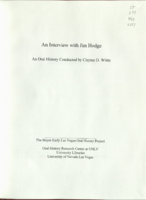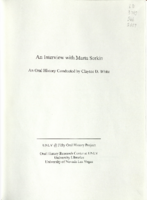Search the Special Collections and Archives Portal
Search Results

Transcript of interview with Jim Hodge by Claytee White, April 13, 2009
Date
Archival Collection
Description
Jim Hodge describes an active and success filled life in this narrative. Born and raised in the South, Jim enlisted in the Navy at the young age of 17, just as World War II was winding down. His primary job was that of a cook. He became smitten with the life of an entertainer after participating in a play and headed for Hollywood in 1952. It was there that he auditioned for Donn Arden, who organized and directed Las Vegas shows. Though he didn't get the part, he did get hired to be a singer for a show featuring Betty Grable. Thus his career was launched and would span the heyday of Las Vegas entertainment from the 1950s to the 1970s. Jim talks about the people, shows and places that touched his life. He also offers thoughts about the changes in the Vegas entertainment scene as well as shares his relationship with his church over the past 40 years.
Text

Transcript of interview with Ruth Annette Mills by Lisa Gioia-Acres, November 20, 2008
Date
Archival Collection
Description
Ruth Annette Mills was born and raised in Washington, D.C. She recalls the early years during WWII, her father's cancer and radium treatment under Blue Cross Blue Shield, his passing when she was nineteen, and her marriage that same year. Ruth and her husband and family lived in Georgia, Texas, and Maryland before coming to Las Vegas in 1968. She worked as a typist for the Office of Education at one point and did volunteer work for her church, the Cub Scouts, and the League of Women Voters. She also worked as a clerk-typist for the Clark County School District, and eventually became a teacher through the Teacher Corps program. She graduated in 1975 and was hired to teach 6th grade at CVT Gilbert. The school integration program was just beginning when Ruth was first hired as a teacher. She held the position of facilitator and recalls how angry parents were when they learned their children had to be bussed to sixth grade centers. Having been involved through her church with the Civil Rights Movement in other states, she was disappointed with the racist attitudes she encountered in Las Vegas. Ruth's involvement with health care began when her daughter-in-law developed kidney stones and was denied treatment. In 1993 she started the Nevada Health Care Reform Project through the League of Women Voters in order to support Bill Clinton's health plan. Fifteen years later, over 100 organizations had come on board to support the League's coalition in favor of Clinton's plan, and her fondest wish is that one day Universal Health Care will be available to all Americans.
Text

Transcript of interview with Flo Mlynarczyk by Claytee White, July 7, 2005
Date
Archival Collection
Description
Flo Mlynarczyk began life in Fort Morgan, Colorado. Her parents divorced and she moved with her mother first to Loveland and eventually to Los Angeles. Her mother started the first Red Cross in Bell Gardens, oversaw the building of their home, and raised money for various charities. Flo remembers when the Japanese were rounded up and interred during WWII. She was in grade school and recalls that one day they all just disappeared. Upon graduation from high school in 1943, Flo moved to Kodiak, Alaska, to live with friends. She recalls total blackouts on the streets of Kodiak due to the war, the Short Snorter Club, and her return to California after a bout of pneumonia. Back in Bell Gardens, Flo worked for a department store, married and divorced in 1945, gave birth to her son Michael in 1946, and ended up in Tonopah, Nevada, with a sister who ran a cafe there. After a second marriage ended, Flo moved to Las Vegas and began working at Phelps Pump and Equipment as a bookkeeper.
Text

Transcript of interview with Amber Allan by David Schwartz, December 21, 2016
Date
Archival Collection
Description
Amber Allan grew up in West Virginia and moved to Las Vegas at the age of 16. She entered the gaming industry in 2000 as a change person at Arizona Charlie’s Boulder where she later held the positions of floorperson and assistant shift manager. Allan would eventually move to Santa Fe Station in 2005 as relief shift manager, later to the Texas Station as a shift manager, and then to Palace Station in 2008 into the slot operations and technical manager role. She then returned to Texas Station at the end of 2008 as director of slot operations and then moved to Aliante Station into the same role in 2009. Allan started at Konami Gaming, Inc. in 2012 where she has worked as an analyst, product specialist, and, currently, as technical sales executive. The interview with Allan begins with her discussion of moving to Las Vegas and the experiences and roles she held as she started in the gaming industry. She discusses the various responsibilities she had in those roles, the types of skills required for them, and the kinds of disputes that are handled in certain supervisory positions. Allan also mentions and discusses the topic of hold percentage as it relates to slot and video poker players. She later describes her philosophy on what makes a good slot floor and also what customers are looking for in slots. Allan then provides the details of her move to the manufacturing side of the slot industry, and she gives her thoughts on what makes both a good and bad slot manager. The interview then shifts to the discussion of free slot play; ticket-in, ticket-out; changes in slot management; and the future of slot machines. The interview concludes with Allan’s discussion of her personal gambling as well as her advice for young people who want to go into the slot industry.
Text

Transcript of interview with Otto Merida by Claytee White, May 18, 2017
Date
Archival Collection
Description
When looking back on his legacy in the Latinx community of Las Vegas, Otto Merida (1945 - ) takes great pride in being a Latin Chamber of Commerce [LCC] co-founder with Arturo Cambeiro. With the LCC, they forged a powerful economic entity that continues to provide the local Latino community with social and political influence. Growing up during the 1950s in Havana, Otto Merida fondly remembers his childhood despite living under the dictatorship of Fulgencio Batista. There were the murmuring sounds of explosions from afar on the way to baseball games, but also the warm Sunday family meals of Cuban soup with fideos. In this interview, he talks about the rising communist powers inspired by revolutionary Fidel Castro and the events that led his family to place him in the Peter Pan Program in 1961. The Peter Pan Program sent unaccompanied Cuban children to the United States to avoid potential instruction by Castro’s government. Merida still holds on to his mother’s final request upon leaving Cuba-“I want you to remember the address where we live and the phone number: Josefina 68-entre primera y segunda-La Víbora, Havana con el teléfono X4304.” As a part of the Peter Pan Program, Merida experienced a nomadic childhood living in barracks in Miami and a three-story home in Wilmington, DE. The only connection he had to his family were a series of letters he exchanged with his mother, until they reunited years later in Miami. For Merida, life on 79th Street and Biscayne Boulevard in Miami was defined by the values of his family and other Cubans and African Americans in his neighborhood. v Merida earned his bachelor’s degree in Political Science from the University of Florida. He credits his sister-in-law with a pivotal role in his decision to pursue a higher education. His engagement in politics continued through his involvement with the Cuban Circle, the first Hispanic community to be involved with politics in Las Vegas. He describes the migration of Cubans to the casino scene of Las Vegas and the presence of Cubans in the community. His work with the Cuban Circle inspired him to develop a political presence for Hispanics in the community. While travelling across the United States before settling in Las Vegas, Merida made many significant relationships while working with associations such as the Fitchburg Chamber of Commerce and Volunteers in Service to America [VISTA]. Living in Las Vegas, Otto Merida worked as an educator and community organizer. In the late 1970s, Merida and Arturo Cambeiro collaborated to create the Latin Chamber of Commerce of Las Vegas. For Merida, the Chamber consistently goes above and beyond the vision he and Cambeiro had created when they first opened their doors. From the creation of the Latino Youth Leadership Program at UNLV to their work alongside political figures such as Senator Catherine Cortez-Masto, Merida is extremely proud of the various accomplishments of the Chamber. Now as President Emeritus, Otto Merida continues to dedicate himself to the Chamber as a volunteer and serves as one of the many Latinx Voices of Southern Nevada that have shaped the greater Las Vegas community.
Text

Transcript of interview with Joyce Moore by Claytee D. White, January 22, 2013
Date
Archival Collection
Description
Joyce Moore's family moved to Las Vegas from Chicago in 1953, when she was eight years old. She attended Rancho High School, married and had three daughters, and currently lives in Las Vegas. Joyce's father was in the gaming industry and her mother was a nurse. Growing up in Las Vegas meant going to shows with her mother, spending summer days in the pool at the Showboat Hotel, and riding horses to the Last Frontier. While a teenager at Rancho High school, Joyce worked at several movie theaters including the Huntridge, went to school dances and marched in the Hellodorado Parade. After her divorce, Joyce returned to work to support herself and her children, first at the Daily Fax then later on the Strip at the Aladdin and Circus, Circus doing a variety of office and accounting jobs. As a lark she and a friend applied to work as cocktail waitresses at the MGM; she was hired and spent the next five years in a job that was by turns interesting, exhausting, frustrating and fun. This interview covers several periods of Joyce's life - her childhood, teen years, and early adult life - and what it was like to grow up, live and work in Las Vegas in from the mid-1950s until the mid-1970s.
Text

Transcript of interview with Joanne Pattiani Molen by Irene Rostine, January 25, 1997
Date
Archival Collection
Description
Interviewed by Irene Rostine. In July of 1955, Joanne Molen's husband was offered a job at Nellis Air Force Base, so they moved from Alturas, California, to Las Vegas. Joanne had worked for Citizens Utilities in Alturas as a Western Union teletype operator, so she got a job with the Southern Nevada Telephone Company. She was the only woman to hold some of the positions she held. She worked for the telephone company, which became Sprint, for more than forty years, ending up as a main engineer. Joanne also was a volunteer and was active in community organizations including the American Ex-Prisoners of War and the Disabled American Veterans organizations, which lead to her being appointed by Governor Richard Bryan to the state of Nevada's Veterans Advisory Commission where she became the first woman to hold the position of chairman for the Commission. She was also voted Women of the Year four times by the local chapter of the American Business Women's Association for her work with veterans.
Text

Transcript of interview with Sonja Saltman by Barbara Tabach, August 18, 2015
Date
Archival Collection
Description
Included in this oral history are reminiscences of Sonja Saltman's personal non-Jewish heritage in Austria, the importance of her grandmother in her life, and how she recalls becoming part of the Jewish community.
Sonja Saltman is a psychologist and philanthropist in Las Vegas, Nevada. She is executive director and co-founder of the Existential Humanistic Institute, a non-profit organization based in San Francisco, California that offers training in existential-humanistic therapy and theory. In 2003 Sonja and her husband Michael Saltman founded the Saltman Center for Conflict Resolution at the University of Nevada, Las Vegas (UNLV) William S. Boyd School of Law. The Saltman Center is focused on research, teaching, and public service related to "the advanced study of the nature of conflict and how to resolve it." A native of Austria, Sonja Saltman also serves as the Honorary Consul for Austria in Las Vegas. The Saltmans are involved with multiple charitable organizations and initiatives, both locally and abroad. Sonja Saltman has served on the boards of the Anti-Defamation League, Nevada Women's Philanthropy, and the Black Mountain Institute. Projects that the couple has supported include the rebuilding of homes and bridges is Bosnia, and Streetball Hafla, a basketball program to improve relations between Jewish and Arab teenagers in Israel. In 2014 Sonja and Michael Saltman were recognized as Distinguished Nevadans by the Nevada System of Higher Education. Included in this oral history are reminiscences of her personal non-Jewish heritage in Austrian, the importance of her grandmother in her life, and how she recalls becoming part of the Jewish community.
Text

Transcript of interview with Gilbert Shaw by Barbara Tabach, May 3, 2016
Date
Archival Collection
Description
In this interview, Gil Shaw recalls milestones at Congregation Ner Tamid?first bat mitzvah?and anecdotes about leaders, first rabbis, donation by Moe Dalitz, services being held in Protestant churches, and even a controversy over colors for the new temple building of Ner Tamid.
Text

Transcript of interview with Marta Sorkin by Claytee White, March 2, 2009
Date
Archival Collection
Description
In this interview, conducted for the 50th anniversary of UNLV, Marta Sorkin discusses her family and her experience moving to California, and then to Las Vegas. Sorkin worked at the James R. Dickinson Library at UNLV and later in Lied Library, helping to implement and update various databases, and create displays on current topics. She briefly discusses her involvement with Hillel and the Jewish Federation of Las Vegas.
Marta Sorkin begins by reminiscing about her childhood in Far Rockaway Long Island, New York. She details the life her parents lived, which set an example for Marta and her two siblings. Through hard work, advanced education, and involvement in causes that were important to them, they created the template by which Marta lives her life. Marta describes her early work history, which included modeling, sales, library work, and working part time in her father's dry-cleaning plant. She and her daughter were living with her parents for a time in California, and they visited Las Vegas on weekends. It was during one of those visits that Marta met her second husband-to-be. They eventually married and decided to settle in Las Vegas. In Las Vegas, Marta enrolled at UNLV, became involved with the Preservation Association of Clark County, and volunteered at the Jewish Federation of Las Vegas. In addition, she completed her BA and MA degrees at UNLV and started working at the university's library. She details her work there, including creating display cases, working in the reference section, doing research for students and faculty, and compiling interviews. Marta also describes the fundraisers she spearheaded to help raise money for the various societies she was involved with: non-events, pancake breakfasts, dinners, and dance and band performances. In her closing comments she mentions an interview she did for Ralph Roske's class and expresses her appreciation for the career she's had at UNLV.
Text
